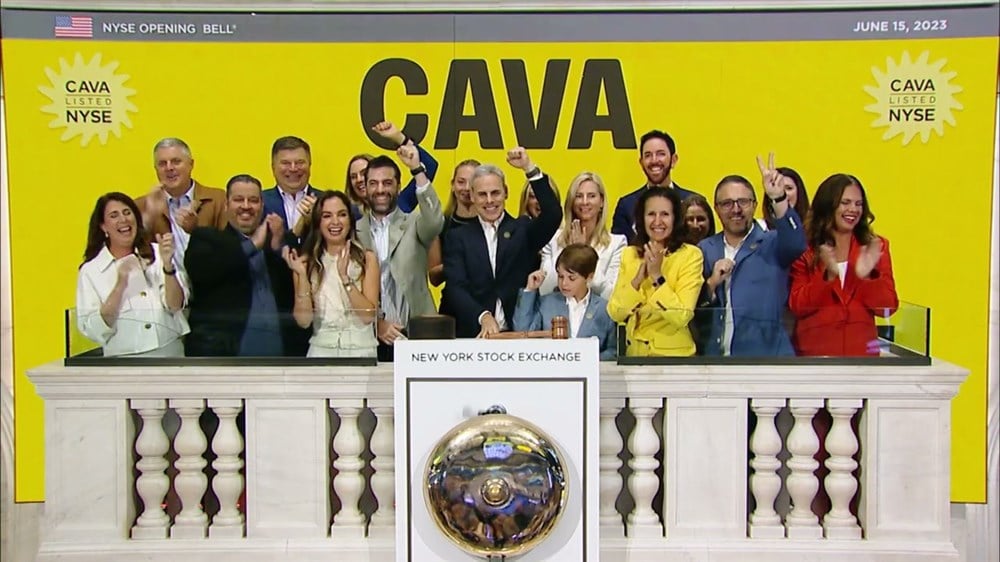
The United States IPO (Initial Public Offering) market had been on a dry spell during the past few months due to more challenging than average financing rates and hurdles, aided by a FED acting to cool down the nation's rampant inflation rate. As the FED acts by reducing liquidity within the economy, accompanied by making more difficult financing via more expensive money, private companies set to go public had to take a back seat and wait for better times.
However, the story changed with CAVA Group (NYSE: CAVA). This new success story attracted many investors as the founders decided it was time to go public.
Considering that CAVA had its IPO price set at $22 per share, today's prices will reflect a doubling ever since, with the latest trading day (Monday) seeing the stock rise by as much as 11%. The valuations perceived by the broader markets are one thing that investors can celebrate.
However, these effects are amplified once they are reminded that the IPO came at a time when markets are wary of unfamiliar faces. Such a reaction calls for further digging in order to justify where the stock trades today, as well as where it may be headed, especially after some are calling it the new Chipotle Mexican Grill (NYSE: CMG)
Key Features
As of the past twelve months, Chipotle's financials will reflect that the business has achieved a 14% ROIC (Return on Invested Capital). This metric is critical for investors since it will begin to merge into the annual stock price performance when it is consistently kept at a specific rate.
Considering that CAVA is a 'growth stage' business, investors have yet to determine any conventional metrics to measure the business relative to the more established Chipotle. Investigations will need to begin at the root; CAVA's prospectus filed with the SEC will contain all the keys investors need to determine whether today's valuations are sensible.
Growth stage companies are mainly judged, amongst other things, by the annual growth rate of underlying sales. CAVA began its revenue drive from $45.4 million in 2016 to its current $564.1 million as of fiscal year 2022. In less than a decade, this massive jump will represent a 52.2% CAGR (Compounded Average Growth Rate), which is massively above the industry and any competitor's growth.
Apart from revenue, investors need to see scalability; Chipotle was successful at growing their sales consistently and achieving growth in store count, enabled by easy adaptability and brand recognition across states.
CAVA has checked green within this department, considering that the brand has only 22 restaurants and has grown to a fascinating 263 by 2022. Again, this will translate into a similar 49% CAGR, heads and shoulders above any other operator in the industry.
As every industry carries its KPIs (Key Performance Indicators), the food and retail industry heavily relies on the 'Comparable Sales' measure. This metric studies the sales growth/decline between stores, eliminating the effect of any location that has operated for less than a year to show analysts the genuine market interest in the product.
Proving Itself
Chipotle finished its latest financial period with a 10.9% comparable sales increase, a desirable rate for a mature company. CAVA has reported, within its prospectus dating up to fiscal 2022, a 14.2% comparable sales growth, which may be severely compressed considering the aggressive new-store opening rates in the brand.
For 2024, when all newly opened stores fall into the 'Comparable' pool, sales will likely reflect a significantly higher range. This thesis may be gaining some traction, considering that the first quarter of 2023, when compared to the first quarter of 2022, saw a 28.4% comparable sales growth rate.
CAVA analyst ratings see a further 4.2% upside in the stock, which may be the beginning of a pending upgrade. As markets quickly assimilated the initial price target, analysts may be faced with evaluating the potential future growth the business promises. The bottom line for investors is common ground amongst growth-stage companies; the expectation for future stock dilution has to be accepted since the business has yet to post net profits that can become reliable and consistent.
Shareholders need to weigh the growth of outstanding shares (dilution) versus the growth of the above metrics, such as comparable sales and store count.

